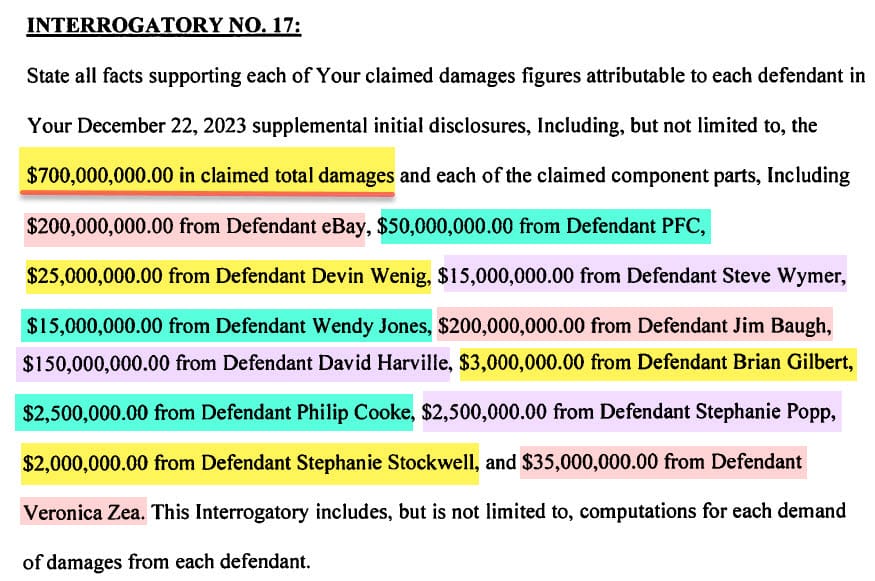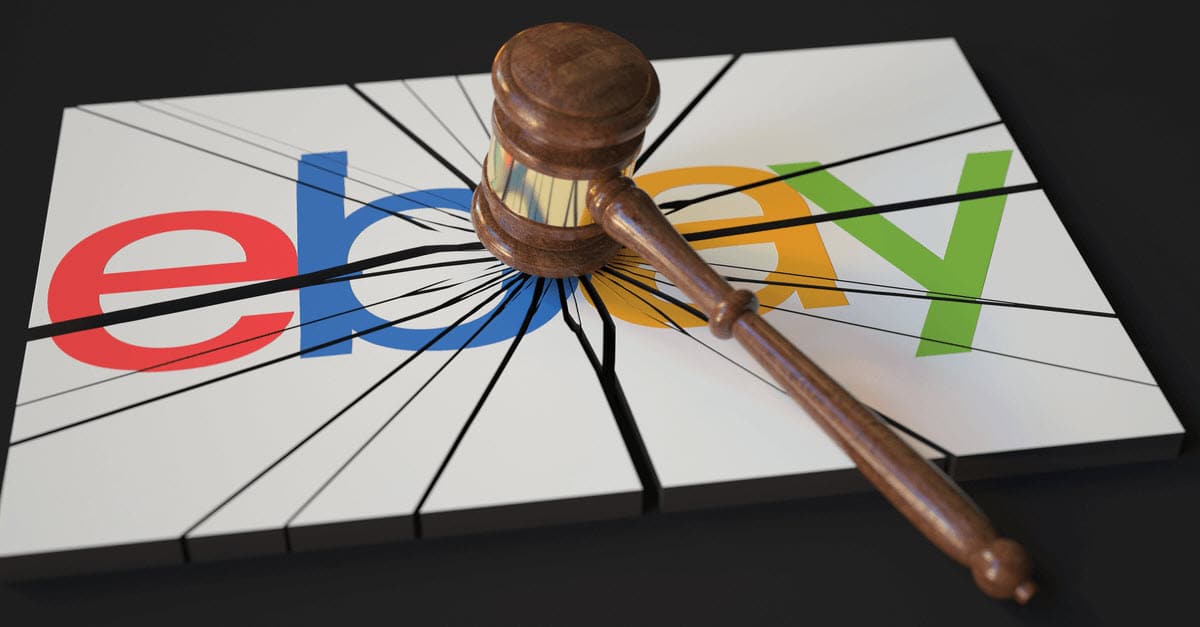Judge Rules eBay May Face Punitive Damages In $700M Cyberstalking Suit
Judge Patti Saris has issued a ruling on motions for summary judgement in the eBay cyberstalking case, clearing the way for plaintiffs Ina and David Steiner to pursue punitive damages from the company and other named defendants for some claims as potential $700 Million lawsuit continues on path to 2025 trial.
The bizarre corporate plot unfolded in the summer of 2019, targeting the Steiners for their reporting on eBay at EcommerceBytes and seeking to unmask the identity of Fidomaster / unsuckEBAY, an anonymous commenter and source who also sparked the ire of top executives at the company.
Court records revealed sordid details of the harassment that included disturbing deliveries of live insects, bloody pig masks and funeral wreaths as well as threatening messages, doxxing that ultimately escalated to in-person stalking and an attempted break-in at the hands of high-level eBay security personnel.
Sr Director Security Jim Baugh, Director of Global Resiliency David Harville, Security Manager Philip Cooke, Sr Manager Special Operations Brian Gilbert, Sr Manager Global Intelligence Stephanie Popp, Global Intelligence Manager Stephanie Stockwell, and Security Analyst Veronica Zea all pleaded guilty and have been sentenced for their roles in these crimes.
eBay signed a deferred prosecution agreement with the Department of Justice that forced the company to admit to a detailed recitation of all the relevant facts involving six felony offenses with eBay paying a $3 Million fine and undergoing 3 years of enhanced compliance monitoring in order to avoid further criminal prosecution related to this matter.
But importantly, that $3 Million was paid to the US Treasury, not the victims, leaving the Steiners to pursue compensation through the civil court system.
The ongoing lawsuit names the seven criminal defendants plus eBay, ex-CEO Devin Wenig, ex-Communications Chief Steve Wymer, ex-SVP Global Operations Wendy Jones, and security company Progressive F.O.R.C.E Concepts (PFC), claiming direction and support for the harassment came from the very top of eBay's c-suite.
The Steiners are seeking $12 million in economic damages for alleged harm to their business, saying advertisers and sources stopped working with EcommerceBytes as a result of the scandal.
But they are also pursuing individual claims for intentional infliction of emotional distress, civil conspiracy, defamation, trespass, false imprisonment, and Massachusetts Civil Rights Act violations - bringing the total damages sought to what was previously only referred to by eBay as "9 figures."
Recent filings in the case reveal the actual amount to be a stunning $700 Million, broken out amongst the various named defendants - eBay and ring-leader Jim Baugh alleged to be the most liable at $200M each, then Harville at $150M, PFC $50M, Zea $35M, Wenig $25M, Wymer and Jones $15M each, Gilbert $3M, Cooke and Popp $2.5M each, and Stockwell at $2M.

It's somewhat surprising to see such a large amount claimed against Veronica Zea, compared to her other criminal co-conspirators.
As a contracted Security Analyst, Zea was the lowest ranking member of the security team involved, which means she put much of the orders from higher up into action.
But some might argue that position could make her a more sympathetic figure, especially considering her relative inexperience and the significant power imbalance compared to the rest of the named criminal defendants.
Zea was also one of the most forthcoming about what happened in the aftermath - both to law enforcement and to the press - with her sentencing memo revealing disturbing details of the toxic culture at eBay when the events occurred.
Judge Saris has been strongly urging the parties to engage in mediation to work toward settling at least some of the civil claims, saying in a recent hearing "I don't see any way in which a jury could decide this with the number of defendants...I just don't have a big enough courtroom for that number and it's confusing to a jury."
She suggested if the lawsuit goes to trial, it may need to be split up, with claims against eBay, the c-suite executives, and the criminal defendants tried in seperate groups in an effort to address the logistical challenges posed by such a complex case.
But all efforts at mediation so far have failed, with both parties unable to come to an agreement about the financial scope of damages that should be considered for negotiating a settlement.
The question of whether the Steiners would be able to pursue punitive damages was cited by eBay's outside council as one of the major sticking points blocking the path to settling at least some claims, with parties on both sides filing motions for summary judgement asking the judge to rule on the matter.
eBay argued punitive damages should not be allowed, saying Massachusetts law should apply, which would block punitive damages in this case.
The Steiners contend California law should apply, which would allow claims for punitive damages to move forward.
In a hearing last month, Judge Saris appeared to be leaning toward Massachusetts law for most issues - but was particularly interested in arguments about defamation & whether potentially defamatory Craigslist ads posted by eBay security personnel pretending to be the Steiners inviting strangers to their house for a sex party were published locally/within Massachusetts or nationally.
Saris issued her ruling on the matter today, splitting the issues up by the different types of claims involved and allowing punitive damages to be pursued for some while denying them for others.
Punitive damages for defamation were not allowed, due to the fact that the Craigslist ads, pornography mailed to neighbors and false Person of Interest reports supplied to the Natick Police were all determined to have primarily occurred within Massachusetts, while the Steiners failed to make a compelling argument why potentially defamatory tweets sent by the criminal defendants should be considered to have greater reputational harm outside of the state.
Statements posted online have “a greater potential to spread,”...and here, the postings meant to solicit strangers to the Steiners’ home were directed at Massachusetts.
Further, defamatory mail was sent to the Steiners’ neighbors, also in Massachusetts...
Though “Persons of Interest” files were kept in California and the tweets were published nationally, the “Persons of Interest” files were shared with the Natick Police Department.
Further, the Steiners failed to discuss the location of their reputational harm in their briefing and did not allege that they “suffered greater special damages in [California] than in the state of [their] domicil,” Massachusetts.
Consequently, § 150 dictates that Massachusetts law apply to the issue of punitive damages for the defamation claim.
Source: Steiner et al v. eBay Inc. et al 1:21-cv-11181 Doc 506
On the claims of trespass, false imprisonment, and Massachusetts Civil Rights Act violations, Judge Saris ruled Massachusetts law would apply, so punitive damages would not be available for those claims either.
The Steiners’ claims of trespass, false imprisonment, and Massachusetts Civil Rights Act violations are rooted in actions taken in Massachusetts, chiefly the physical surveillance and vandalism that exacerbated their fear for personal safety.
The defendants traveled to Natick, Massachusetts, to vandalize the Steiners’ fence, install a GPS tracker on their car, and “predatorily stalk and surveil” them.
In addition to these actions, the Steiners claim the “incessant packages” that arrived at their home in Massachusetts forced them to remain confined to their home and threatened to silence their blog.
In short, the most distressing conduct underlying the claims of trespass, false imprisonment, and Massachusetts Civil Rights Act violations occurred in Massachusetts.
Source: Steiner et al v. eBay Inc. et al 1:21-cv-11181 Doc 506
The Steiners' remaining claims of intentional infliction of emotional distress and civil conspiracy covered not just the physical stalking and surveillance but also the broad range of criminal conduct that was carried out online, emanating from eBay's San Jose, California headquarters.
That connection was enough for Judge Saris to rule that punitive damages for those claims can be pursued in this case, as California would have countervailing interest in deterring malicious and extreme conduct by corporations domiciled in their state.
However, with respect to the intentional infliction of emotional distress and civil conspiracy claims, California’s countervailing interest in deterring such malicious and extreme conduct by its corporate domiciles prevails since the most significant of the unlawful conduct took place within its borders.
Consequently, for these claims, the Steiners in this case rebut the general presumption that the law of the state where theinjury occurs governs...
...Accordingly, given that the conspiracy to harass, intimidate, and threaten the Steiners originated in California and a substantial amount of the distressing conduct occurred there as well, California’s interest in applying punitive damages to conduct that occurred within its borders by one of its resident corporations outweighs any interest Massachusetts might have in protecting eBay “from excessive liability” for actions taken in California.
Source:Steiner et al v. eBay Inc. et al 1:21-cv-11181 Doc 506
The ruling will likely reduce the total amount of damages being sought by the victims, but the remaining punitive claims for intentional infliction of emotional distress and conspiracy could still be grounds for a significant payout either through mediated settlement or a jury trial sometime next year.
Andrew Finkelstein, a lawyer for the Steiners at Finkelstein & Partners, told Reuters in a statement that Saris' decision was "important to the couples' efforts to stand up to such corporate activities."
"Punitive damages are intended to deter such behavior in the future, and the Steiners are pleased a jury will be able to send such a message with a money verdict."
Representatives for eBay did not immediately respond to requests for comment.





















Settle up eBay. How much cash did eBay just return to shareholders last quarter? Yep.
And for anyone working ANY corporate (or government) job, best to get liability insurance, as much as you can afford. I certainly did. One never knows when you might be dragged into some case even if you're "just the lowly analyst / consultant."